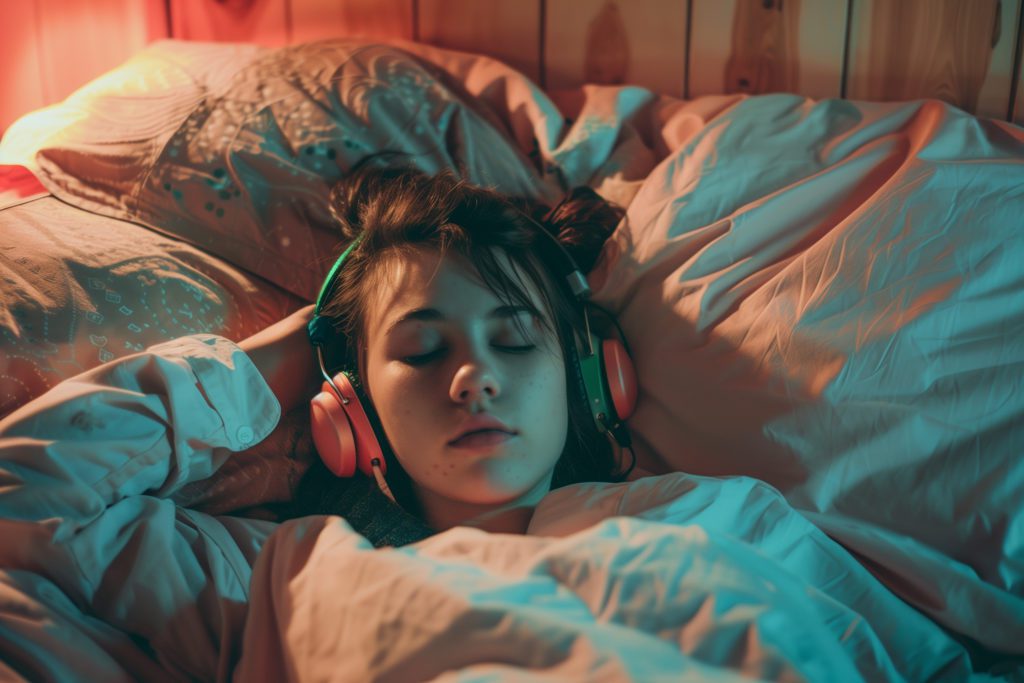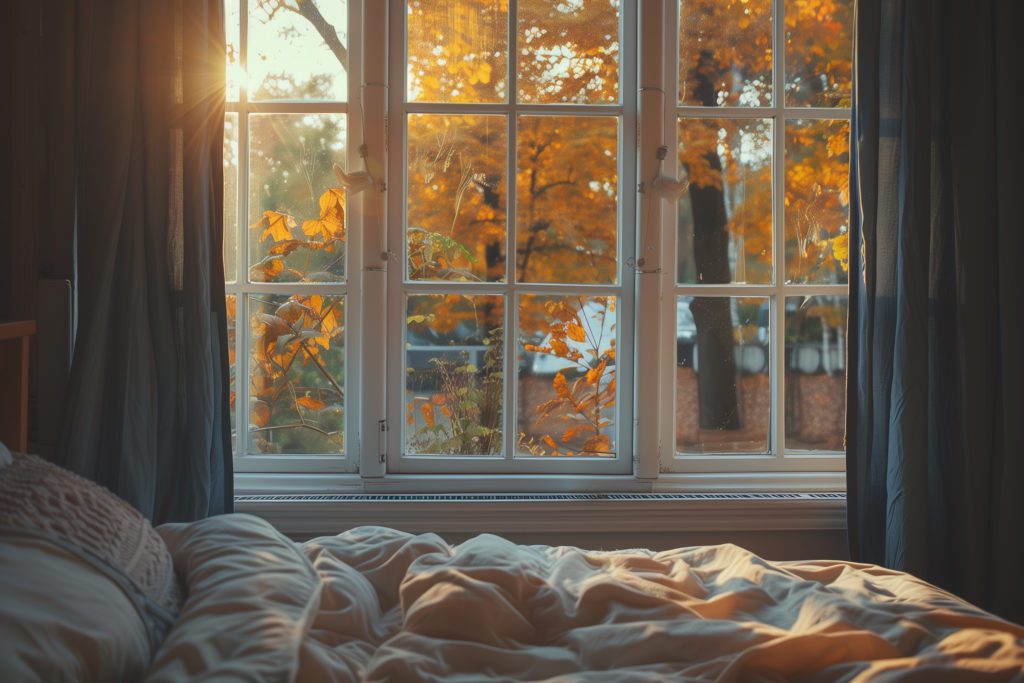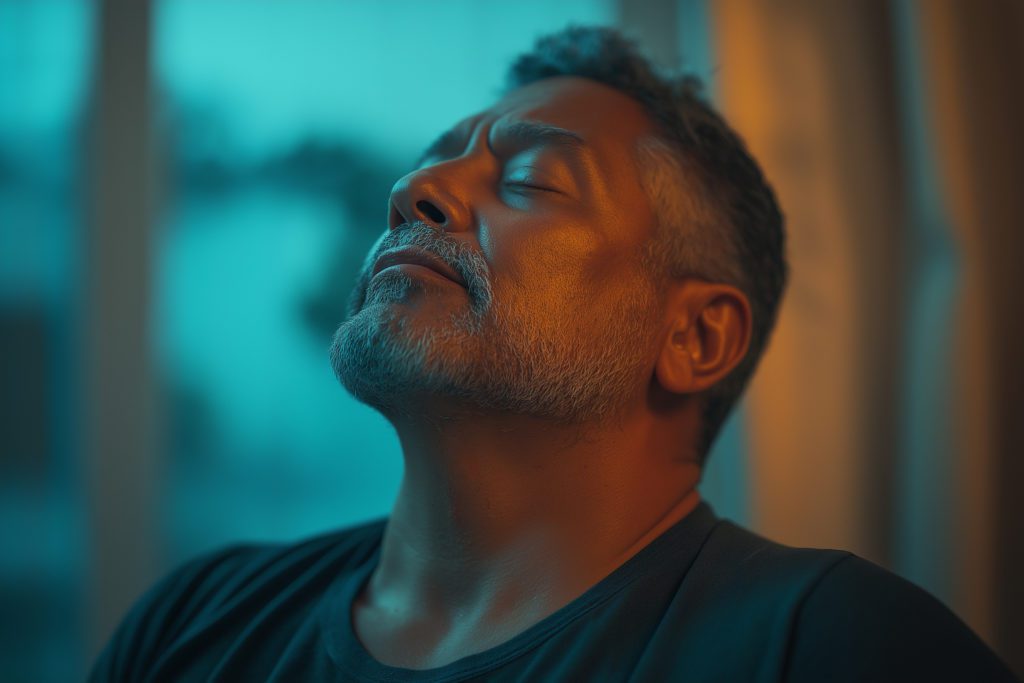
Music Therapy for Sleep Disorders in Special Populations
Music can help you sleep by calming your mind and body, offering a cover for loud noises, and reducing pain. See how music can help special populations.

Music is powerful and can do more than get your foot tapping. Even though music is often associated with upbeat rhythms and dance-provoking sounds, it can also be useful in helping you sleep better, especially if you’re elderly, neurodivergent, or managing a medical condition on top of a sleep disorder.
When the right music is chosen, it can help you relax and feel more at ease, two things that equate to an easier time falling asleep. There’s a reason why babies are lulled to sleep with a lullaby, and the sleep-benefiting nature of gentle music doesn’t have to end when our age reaches the double digits.
Music and Your Brain
Have you ever wondered what happens inside your head when you hear music?
Music enters your ear through sound waves that are quickly transmitted into electric signals, which are then sent to the brain. Once the signals reach the brain, something magical happens—a cascade of physical effects throughout the entire body are triggered, some dependent on the type of music and others occurring no matter the music type.
Your hormones, such as cortisol, are one area that can be affected by music. Cortisol is the body’s stress hormone and, when it’s produced, it sends a signal to your body to increase its heart rate and body temperature, two things that are in direct opposition to the state your body wants to be in when going to bed.
Music has been shown to reduce cortisol levels (even in those undergoing surgery!), which offers a physiological explanation for why you feel more relaxed when listening to music—it reduces the amount of stress hormone circulating in your body.
Music can also affect the hormone dopamine, more commonly known as the “feel good” hormone because it’s released during exercise, eating, and sex. When dopamine is released, your body feels better, partly because it reduces pain, and music is one way to trigger dopamine’s release.
In addition to your hormones, music can also soothe your autonomic nervous system, which controls processes completed by your lungs, heart, and digestive system. Slow music has been shown to slow breathing, reduce blood pressure, and lower heart rate, all of which are controlled by the autonomic nervous system, demonstrating music’s ability to influence it.
How Music Helps You Sleep
There are many benefits music offers that translate into a better night of sleep, even if you’re elderly, neurodivergent, or living with a medical condition.
Music Calms Your Body
Music lowers cortisol levels and soothes the autonomic nervous system, which reduces stress, slows your heart rate, lowers your blood pressure, and slows your breathing. All of these actions help to calm your body, which makes it easier to slip into sleep.
Music Distracts Your Mind
Music offers something to focus on while you fall asleep, which can be a welcome reprieve if your inner thoughts are keeping you up or if you’re focused on a recent medical diagnosis.
Music Melts Away Pain
Music triggers the release of dopamine, which helps to reduce pain. Research into the effects of music on the body even suggests that it may be used as an alternative to opioid pain relievers, even in those with chronic pain. For those with medical conditions experiencing poor sleep due to pain, music may offer a solution.
Music Blocks Out Distracting Sounds
When you’re asleep, disturbances may rouse you and prevent you from sleeping soundly through the night, but music acts as a buffer, covering distracting noises so that they don’t wake you up.
How Music Overcomes Sleep Disorders in Special Populations
Certain populations may be at a greater risk of sleep disorders, but music can serve as a remedy.
Insomnia is the world’s most common sleep disorder and is characterized by a difficulty falling or staying asleep. Many things may cause insomnia, such as stressful thoughts, an inability to get comfortable, or a too-long daytime nap.
Certain people may be more likely to have insomnia. For example, research shows that children and adolescents with Autism Spectrum Disorder are more likely to experience insomnia, with a prevalence of 40% to 80%. Older adults, as well, are more susceptible to insomnia, with up to 50% of older adults reporting symptoms.
For those with insomnia, music can help by lowering your cortisol, offering something for your mind to focus on, and calming your body.
Circadian rhythm sleep disorders are another type of condition in which the body’s natural sleep-wake cycle (circadian rhythm) is disrupted, making it hard for the body to tell when it’s time to wake up or sleep. One cause of this disruption in older adults is neurodegenerative disorders.
One treatment for circadian rhythm disorders is to focus on improving sleep hygiene, such as by implementing and following a bedtime routine. When music becomes part of your routine, your body will recognize the pattern and associate the calming music with an impending bedtime.
Finally, parasomnias are sleep disorders in which the person displays abnormal behaviors during sleep, such as sleepwalking, night terrors, or REM sleep behavior disorder. Often, parasomnia events are triggered when someone is slightly awakened during the transition from one sleep stage to the next, whether it’s from noise, temperature changes, or restlessness.
Music offers two benefits for parasomnias. First, it can act as a mask that prevents the individual from waking, which then keeps them from having a parasomnia episode. Second, music can reduce stress and anxiety, which parasomnias are associated with. In this way, music can both ease anxiety and improve sleep, offering double the benefits for your well-being.
Adding Music to Your Nighttime Routine
If you struggle to fall and stay asleep because of a sleep disorder, music therapy may be able to help. When implementing it, be sure to keep these things in mind:
- Build a habit. A sleep routine is something that needs to be completed each night, so if you’re adding in music, be sure to do it every night. Furthermore, make sure you’re giving yourself enough time to truly enjoy the music and benefit from its calming nature.
- Choose the right tunes. The songs you pick matter, so opt for those that calm you down. These are often songs with a slower beat, but experiment to see which songs serve you best. Try to avoid songs that bring out strong emotions, though—that’s non-conducive for sleeping.
- Use a speaker. Using headphones while sleeping may damage your ears if the volume is too high, so opt for a speaker near the bed instead and make sure the volume isn’t too loud.
Music offers the potential to improve sleep onset and quality in special populations by calming the body and mind, making sleep easier to come by, and lessening the likelihood of waking during the night because of its ability to mask distracting sounds. Give music a try leading up to bed and see if some calming tunes can help you sleep more peacefully.

Written by
Jessica G
Medical writer freelancer who has written hundreds of articles on varying topics. Masters of Engineering degree in Biomedical Engineering.
Download Pillow
Get help
Press & News
Legal
Connect
X (Twitter)
Company
Copyright © Neybox Digital Ltd.



